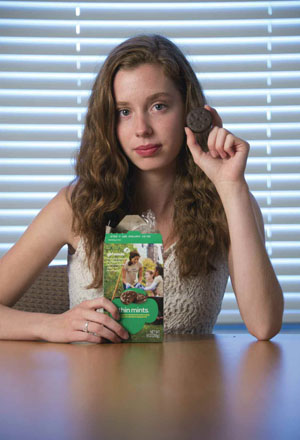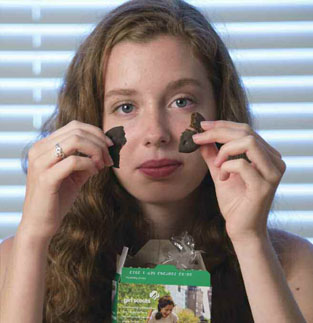Girl Scout cookies are an emblem of childhood, a reminder of one of the few knocks on the door by a youngster on a fundraising mission that is almost universally welcomed. Samoas, Peanut Butter Patties, Trefoils. (Is your mouth watering yet?)
Not one of them has passed Vorva’s lips since 6th grade. Once an eager Brownie scout who earned a badge for selling more than 50 boxes, the Pomona College freshman cringes at the sight of those cookies after a Girl Scouts project on environmental consciousness she undertook in middle school grew into a national campaign against the use of unsustainably farmed palm oil and caught the interest of The New York Times, The Wall Street Journal, Time magazine and ABC News, among a host of others.
 The hook, almost predictably, was that after launching a community awareness project detailing how palm oil can contribute to deforestation, destruction of orangutans’ habitat, global warming and human rights abuses, Vorva and partner Rhiannon Tomtishen, a former classmate who will attend Stanford next year, discovered they had been peddling the stuff door-to-door.
The hook, almost predictably, was that after launching a community awareness project detailing how palm oil can contribute to deforestation, destruction of orangutans’ habitat, global warming and human rights abuses, Vorva and partner Rhiannon Tomtishen, a former classmate who will attend Stanford next year, discovered they had been peddling the stuff door-to-door.
In 2007, they stopped selling cookies. “I had learned about palm oil plantations where orangutans were considered pests. They were set on fire and killed. I was outraged,” says Vorva, who was inspired by the work of chimpanzee expert Jane Goodall. “I started looking for the ingredient everywhere.
“Then Girl Scout cookie season rolled around and I turned over the box and there was palm oil. I was like, are you kidding me? Part of the Girls Scouts’ mission statement is to make the world a better place and use resources wisely. That’s been ingrained in me since first grade.”
AS THE GIRLS BECAME TEENAGERS, they became the Girl Scouts who were thorns in the side of the Girl Scouts of America, pressuring the organization to use only sustainably farmed palm oil in the nearly 200 million boxes of cookies its members sell each year. This led Vorva to speaking engagements around the country and a trip to Colombia, a country that produce palm oil alongside leading producers Malaysia and Indonesia.
The young women stood in front of the White House in Washington, D.C., holding a sign to try to draw the attention of First Lady Michelle Obama. They went to the Girl Scouts of America corporate office in New York in 2011, expecting a meeting with then-CEO Kathy Cloninger. Instead, Vorva says, they got a “photo op,” meetings with merchandise executives and badges for meeting the CEO and visiting the national headquarters.
In 2011, their lobbying finally led to a new Girl Scouts policy that Vorva and Tomtishen consider only a partial success: Since 2012, Girl Scout cookie boxes have carried the GreenPalm logo, indicating that their bakers participate in a certificate-trading program meant to offset use of unsustainable palm oil by offering a premium to palm oil producers who grow their crops under guidelines from the Roundtable on Sustainable Palm Oil.
What the policy does not guarantee is that the palm oil actually in the cookies was sustainably farmed or is “rainforest safe,”—Vorva’s goal since determining it was unlikely snack-food makers would eliminate palm oil, a widely used ingredient in packaged foods that the Girls Scouts organization says their bakers tell them is necessary to ensure shelf life and serve as an alternative to trans fats.
“When I was 11 years old, it was, ‘I’m going to take palm oil out of Girl Scout cookies, and then I’m going to take it out of Twix, and then I’m going to take it out of shampoo, and I’m going to take it out of everything.’ But as I’ve grown up, that’s not realistic,” Vorva says.
The Girls Scouts organization also has pledged to urge its licensed bakers to move to segregated, certified sources of sustainable palm oil by 2015, “based on market availability.” Vorva says the policy needs to be stronger.
“They decided to come up with a policy that looked really good on cardboard—on cardboard boxes—and hope it would go away,” she says. “It’s better than nothing, but it’s not deforestation- free. It’s not traceable and there are not a lot of human rights protections in the guidelines.”
Amanda Hamaker, director of Girl Scout Merchandise Strategic Initiatives, declined to comment for this article. When the policy was announced in 2011, Hamaker said that “Girl Scouts’ palm oil use is very small, but our voice is big” and called Vorva and Tomtishen “shining examples of leadership in persuading a 99-year-old American icon to take on a serious global issue.”
An empty cookie box isn’t the only souvenir Vorva, known as “Madi,” has of her campaign. Far more impressive is the heavy medal on a green ribbon. It is a United Nations award she, along with Tomtishen, won as a 2011 U.N. Forest Hero after being nominated by the Union of Concerned Scientists. The students, then 16 years old, were two of only six winners worldwide and the only ones from North America.
Not a bad thing to have on your college application.
SITTING IN A LECTURE ROOM in Edmunds Hall, a LEED gold-certified building that opened in 2007, Vorva blends in easily, a fresh-faced 18-year-old with cascades of strawberry blonde curls wearing a sleeveless dress to fend off the September heat. She looks much like any other freshman taking Introduction to Environmental Analysis, but her reputation precedes her.
Professor Char Miller, W.M. Keck Professor and director of the Environmental Analysis Program, recalls meeting Vorva on her admissions visit. “Within about a minute and a half, I was recruiting her as hard as I could,” says Miller, praising Vorva and what he called her “sophisticated” campaign. “She’s 18 going on maybe 36. She’s so mature and has had such an imaginative response to the orangutan issue and more generally to environmental issues. It’s really mind-blowing.”
Vorva, who grew up in Plymouth, Mich., the daughter of Jerry Vorva, a former Michigan state legislator, and Joan Crimmins, a financial analyst, also considered attending the University of Michigan in Ann Arbor, where she went to Greenhills School, a private high school whose flexibility she credits with helping her continue her work on the palm oil issue. “If I had gone to public school with my absences, I’d never have been able to graduate,” she says.
 Her accomplishments earned her less interest from Ivy League schools than one might expect—Vorva says she couldn’t afford to take a test-preparation class and didn’t do as well on the SAT as she might have hoped—but she learned about Pomona when she used the college search tool on the website of the College Board, administrator of the SAT. “Pomona was the only one that came up. And I was like, oh, that’s kind of terrifying,” Vorva says. “So I’d never even heard the name before and it introduced me to this small liberal arts school.”
Her accomplishments earned her less interest from Ivy League schools than one might expect—Vorva says she couldn’t afford to take a test-preparation class and didn’t do as well on the SAT as she might have hoped—but she learned about Pomona when she used the college search tool on the website of the College Board, administrator of the SAT. “Pomona was the only one that came up. And I was like, oh, that’s kind of terrifying,” Vorva says. “So I’d never even heard the name before and it introduced me to this small liberal arts school.”
Two visits later, Vorva moved into her dorm in August. Already, she is wrestling to keep her activism going alongside the increased demands of college. Vorva missed a week of class in September to appear at the Great Apes Summit at the Jackson Hole Wildlife Film Festival in Wyoming, once again meeting her mentor, Goodall. (She says one of her goals is to have Goodall visit campus during the next four years.)
In addition to her travel, Vorva estimates she often spends one to two hours a day on the project, working online and participating in several conference calls a week with Tomtishen or nonprofit partners that have included the Rainforest Action Network.
Concerned about missing more time in class because of travel than a professor would allow, Vorva contacted Professor Eleanor P. Brown, James Irvine Professor of Economics and chair of the
Economics Department.“I told her, ‘I don’t know what to do about a fourth class and I’m worried,’” Vorva says. “She says, ‘Oh, take intro Microeconomics and I’ll help you out once you come back if you have any questions.’ And this is the head of the Economics Department who I probably wouldn’t be meeting at another school, unless I was an econ major. I was so relieved to find that support, coming here. And that’s why I’m here.”
ALREADY SKILLED AT PUBLIC SPEAKING as well as working with nonprofits and utilizing social media, Vorva anticipates a major in environmental analysis, public policy or international relations and later attending graduate school, perhaps in business.
Vorva says she would like to write about environmental issues and continue to try to inspire other activists. But in what might be a surprise to some, she hopes to work for a big corporation someday.
In August, she and Tomtishen visited the Kellogg Co. in Battle Creek, Mich., to deliver a petition with more than 100,000 signatures on the palm oil issue gathered by a consumer organization called SumOfUs. Vorva would like to return someday as an employee. “My message has been to show consumers that their everyday purchases are having these global impacts. So if I can work for a company like Kellogg’s and decide where their raw materials are coming from, I’d love to do that. “Everyone says I’d be selling my soul, that you’re a bad guy for doing that, or ‘Why would you go to the dark side?’
“I’ve worked with a lot of nonprofits. There’s only so much they can do …. If I can be someone who makes decisions, I can work from within to change policies, change the sources.” As she prepares to “graduate” from Girl Scouts, Vorva, a registered lifetime member, completed a final project from her dorm room to earn her Girl Scout Gold Award—the equivalent of Eagle Scout—by building a sophisticated website, www.changestartswithapassion.org, to give young people resources for starting their own projects.
“So it’s like, how do you identify your passion? Or how do you take a campaign from your local community to something national?” she says.
Life as an activist isn’t always easy. A box of Cheez-Its stands on a shelf in her dorm room. “These have palm oil,” she says with a hint of resignation. “I eat them and I shouldn’t.” Glancing at the old Thin Mints box again, she sighs. “I’d still love to eat a Girl Scout cookie if I could.”
